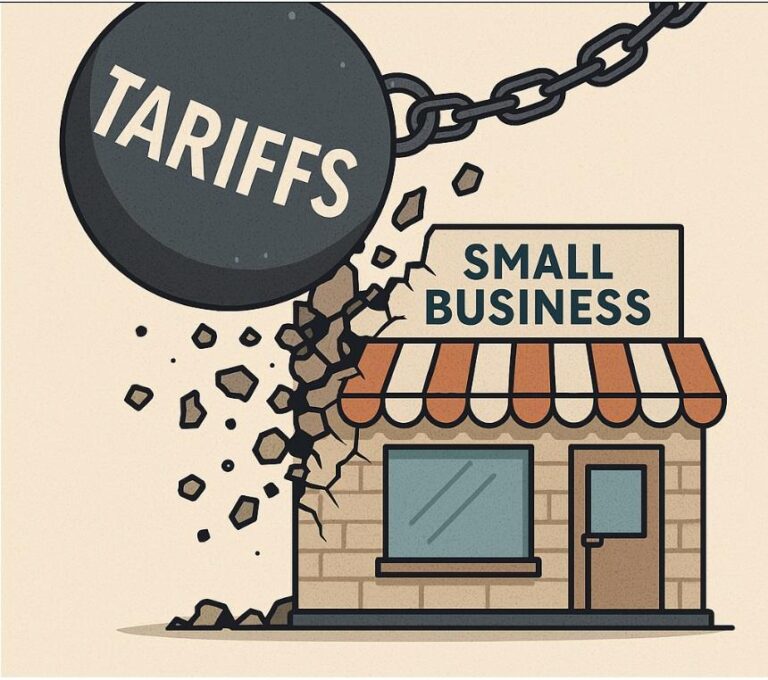Transforming the Small Business Landscape: The Impact of Tariffs in the U.S.
Financial Strain and Profitability Challenges for Small Businesses
Small businesses across America are increasingly burdened by rising tariffs on imported goods, which significantly inflate their operating costs. Recent data from the U.S. Chamber of Commerce reveals that these additional expenses are squeezing profit margins, limiting growth potential, and threatening the overall stability of the small business sector—an essential pillar of the U.S. economy.
Unlike multinational corporations that benefit from economies of scale and bulk purchasing power, smaller enterprises often lack the resources to absorb these tariff-related cost increases. As a result, many are compelled to either bear the higher costs themselves or pass them on to consumers, potentially reducing sales volume and hindering expansion. Moreover, the volatility of tariff policies complicates budgeting efforts, making it difficult for small business owners to maintain consistent pricing strategies.
- Increased costs of raw materials: Essential inputs become more expensive, eroding competitive pricing.
- Supply chain interruptions: Tariff changes lead to renegotiated supplier contracts and shipment delays, disrupting inventory flow.
- Uneven competitive landscape: Domestic competitors not affected by tariffs may gain pricing advantages.
| Affected Area | Impact on Small Businesses |
|---|---|
| Profit Margins | Reduction by up to 15% in sectors hit by tariffs |
| Price Predictability | Frequent fluctuations causing uncertainty |
| Expansion Prospects | Reduced investment in hiring and scaling operations |
Trade Policy Complexities and Their Toll on Small Business Owners
Small business owners often grapple with the intricate and ever-changing landscape of trade regulations, which can impede their ability to compete on a global scale. The frequent modifications in tariff rates and the complexity of compliance requirements demand expertise and resources that many small enterprises lack. Unlike large corporations equipped with specialized legal and trade departments, smaller firms face challenges in adapting swiftly, leading to increased operational costs and hesitancy in pursuing international opportunities.
Key challenges include:
- Volatile tariff policies: Sudden changes disrupt financial forecasting and cash flow management.
- Heavy compliance demands: Administrative burdens divert focus and resources from core business activities.
- Limited access to expert advice: Many small businesses cannot afford consultants to navigate complex trade laws.
| Challenge | Impact on Small Businesses |
|---|---|
| Tariff Volatility | Complicates budgeting and necessitates frequent price adjustments |
| Regulatory Complexity | Increases operational costs and causes shipment delays |
| Resource Constraints | Limits agility and investment in growth strategies |
Strategic Solutions for Small Businesses to Mitigate Tariff Impacts
To alleviate the financial pressures imposed by tariffs, small businesses can adopt several proactive strategies focused on cost control and operational adaptability. One effective approach is diversifying the supplier base by sourcing from countries with lower or no tariffs, thereby reducing reliance on expensive imports and enhancing supply chain resilience.
Negotiating supplier agreements that include provisions for tariff fluctuations can help distribute risk more equitably. Maintaining transparent communication with customers regarding price changes fosters trust and customer retention.
Embracing technology also plays a vital role. Implementing automation and advanced inventory management systems can optimize workflows, minimize waste, and improve efficiency, offsetting some tariff-related costs. Additionally, forming alliances with other small businesses through purchasing cooperatives or joint ventures can unlock bulk purchasing discounts and shared logistics advantages, further softening tariff effects.
- Broaden supplier networks to include tariff-friendly regions
- Incorporate tariff adjustment clauses in contracts
- Utilize automation and inventory optimization tools
- Participate in collective buying groups or partnerships
- Communicate pricing changes openly with customers
Policy Recommendations from the U.S. Chamber of Commerce to Support Small Businesses
The U.S. Chamber of Commerce urges policymakers to reconsider current tariff frameworks to alleviate the financial strain on small businesses, which often lack the capacity to absorb increased costs. Their principal recommendations include:
- Selective tariff reductions on critical raw materials and intermediate goods to decrease production costs and boost competitiveness.
- Improved transparency in tariff enforcement to provide businesses with timely, clear information for better planning.
- Expansion of trade agreements to secure more stable market access and reduce reliance on punitive tariffs.
Additionally, the Chamber advocates for enhanced support mechanisms tailored to small enterprises, such as:
- Comprehensive trade education programs to equip businesses with the knowledge needed for international commerce.
- Access to specialized legal and financial advisory services to assist with tariff compliance and dispute resolution.
| Policy Proposal | Expected Outcomes |
|---|---|
| Targeted Tariff Reductions | Lower production expenses and improved profitability for small firms |
| Broadened Trade Agreements | Greater market access and fewer trade obstacles |
| Trade Education Initiatives | Enhanced adaptability and growth potential for small enterprises |
Looking Ahead: Steering Small Businesses Through Tariff Challenges
As tariffs continue to shape the economic landscape, small businesses nationwide confront rising costs and operational uncertainties. The U.S. Chamber of Commerce emphasizes the importance of policymakers carefully weighing these impacts to avoid unintentionally weakening local economies. Achieving a balance between national trade goals and the sustainability of small businesses will be crucial in fostering a robust and thriving economic future.




